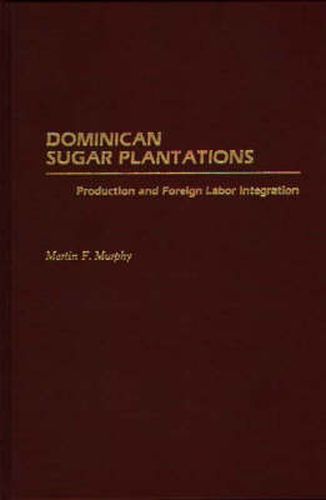Readings Newsletter
Become a Readings Member to make your shopping experience even easier.
Sign in or sign up for free!
You’re not far away from qualifying for FREE standard shipping within Australia
You’ve qualified for FREE standard shipping within Australia
The cart is loading…






Primarily focusing on the organization of production and labor use practices in the Caribbean’s second largest sugar industry, this work’s historical, macroeconomic, political, and sociocultural components depict the reality of today’s Dominican sugar economy. The Dominican Republic has been radically altered by its internationally oriented sugar economy–its society and national culture transformed and its political, legal, and economic structures modified. This book describes the progressive replacement of national labor in the sugar industry by foreign workers. Comparing the three distinct sugar corporations, it concludes that all three exploited foreign labor. The study refutes modern slavery charges through social science theory and extensive field research. Depicting living and working conditions in the fields, it concludes that slavery charges are the result of superficial analyses of symbols. More in-depth analyses display one of the most extreme forms of superexploitation in the twentieth century.
Addressing present-day labor utilization strategies in the Dominican Republic sugar plantation system, Martin Murphy focuses on three areas: the logic of production, foreign labor integration, and a comparative analysis of three corporations. His first two chapters provide an overview of the historic and contemporary Dominican sugar industry. Historical patterns of labor recruitment and use are then presented in Chapter 3. Chapter 4 describes the basic logic of production and use of various types of labor for the plantations of the 1980s. Murphy’s last four chapters address the question of heavy reliance on Haitian labor: Chapter 5 provides a history of Haitian migration; Chapter 6 discusses factors of expulsion and attraction which condition present-day Haitian migration to Dominican fields; Chapters 7 and 8 conclude with questions of Haitian ethnicity and its relationship to production organization.
$9.00 standard shipping within Australia
FREE standard shipping within Australia for orders over $100.00
Express & International shipping calculated at checkout
Primarily focusing on the organization of production and labor use practices in the Caribbean’s second largest sugar industry, this work’s historical, macroeconomic, political, and sociocultural components depict the reality of today’s Dominican sugar economy. The Dominican Republic has been radically altered by its internationally oriented sugar economy–its society and national culture transformed and its political, legal, and economic structures modified. This book describes the progressive replacement of national labor in the sugar industry by foreign workers. Comparing the three distinct sugar corporations, it concludes that all three exploited foreign labor. The study refutes modern slavery charges through social science theory and extensive field research. Depicting living and working conditions in the fields, it concludes that slavery charges are the result of superficial analyses of symbols. More in-depth analyses display one of the most extreme forms of superexploitation in the twentieth century.
Addressing present-day labor utilization strategies in the Dominican Republic sugar plantation system, Martin Murphy focuses on three areas: the logic of production, foreign labor integration, and a comparative analysis of three corporations. His first two chapters provide an overview of the historic and contemporary Dominican sugar industry. Historical patterns of labor recruitment and use are then presented in Chapter 3. Chapter 4 describes the basic logic of production and use of various types of labor for the plantations of the 1980s. Murphy’s last four chapters address the question of heavy reliance on Haitian labor: Chapter 5 provides a history of Haitian migration; Chapter 6 discusses factors of expulsion and attraction which condition present-day Haitian migration to Dominican fields; Chapters 7 and 8 conclude with questions of Haitian ethnicity and its relationship to production organization.